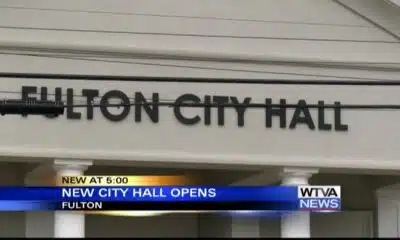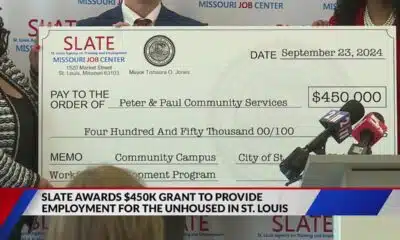Mississippi News
Mississippi wants to dole out tax dollars as venture capital to startups. What could go wrong?
Mississippi wants to dole out tax dollars as venture capital to startups. What could go wrong?

Mississippi lawmakers are considering getting into the venture capital business, using your tax dollars to float startup businesses.
What could go wrong?
Well, if history is any guide — plenty. The last time the state tried this, millions of dollars were misspent and stolen, no new businesses got started, somebody went to prison, and the state spent years trying to untangle what went wrong.
Taxpayers would’ve been better off if someone had taken their money down to the boats and played craps with it.
First, the new proposal: With the American Rescue Plan Act, Congress earmarked $10 billion to reauthorize the State Small Business Credit Initiative. This initiative was first created in 2010 after the Great Recession, and funded with $1.5 billion in federal tax dollars to help stimulate small business entrepreneurship through loans and investments.
FOLLOW THE MONEY: Our full tracking of Mississippi’s historic influx of federal cash
Mississippi got about $13 million back then and, like many other states, just created small business loan programs. Some states also used the money for venture capital, but Mississippi did not in part because it was a relatively small amount and also in part because of its past massive boondoggle mentioned above — but more on that later.
Now, Mississippi is set to receive about $52 million. And the Mississippi Development Authority is asking lawmakers to give the agency authority to stand up a private nonprofit and create a venture capital fund with part of the money. It’s asking for this authority because, as MDA’s Chief Operating Officer Jamie Miller explained to lawmakers, “the state constitution does not allow the state to have an equity interest in a private businesses.”
The plan would be for the new nonprofit venture to get some private venture capitalists to also pitch in, find the next Google or Amazon being cooked up in someone’s garage in Toomsuba, give it money to get rolling and bingo — we’re in the money.
Now, for the history: With business leaders long lamenting the lack of venture capital floating around Mississippi, lawmakers in 1994 decided to help out, under the auspices of MDA’s predecessor agency. They approved $20 million in borrowing, and the creation of a private nonprofit to funnel the borrowed tax dollars to Magnolia Venture Capital Corporation.
But by 1997, Magnolia Venture had blown about $4.5 million on overhead including what an investigation would deem “questionable and extravagant” spending by its CEO and board. The CEO — later convicted of fraud and money laundering — had paid himself $747,000 in salary and bonuses over 18 months, and awarded companies he owned or was affiliated with $1.2 million.
Magnolia did not help a single startup get started up, and its only capital investment was $600,000 to an already existing company. The loan private investor Magnolia suckered in promptly pulled out, and the state was left holding the bag on millions of dollars in interest payments.
When the latest proposal for MDA to stand up a venture capital (also known as “risk” capital, for good reason) got pitched at the Capitol, many folks who’d been around more than a minute immediately thought of Magnolia Venture.
But MDA Interim Director Laura Hipp said these are different times, and the ARPA funds would be subject to both federal and state scrutiny light years beyond that of the mid-1990s. A new program would require the federal venture dollars be matched with private investment (but the Magnolia Venture scheme ostensibly did, too) and MDA would closely monitor the workings of the new venture capital venture.
The proposal was offered in two “mirror” bills, Senate Bill 2772 and House Bill 1164. The House version was passed on to the full chamber by the Ways and Means committee last week with little discussion and no debate. But in the Senate, after much debate and some reminiscing about Magnolia Venture, the Finance Committee stripped out the venture capital/private nonprofit language before sending it to the full Senate.
The Senate debate over the bill created somewhat strange bedfellows. Both Sen. David Blount, D-Jackson, and Sen. Chris McDaniel, R-Ellisville — often at odds politically — decried the venture capital proposal as a bad idea.
Both shared the sentiment that the state “should not be in the business of picking winners and losers” by handing out tax dollars to fund speculative startup businesses.
Blount reminded his colleagues of Magnolia Venture, “a giant scandal that resulted in millions of dollars squandered.”
“The state has enough to do without getting into the venture capital business,” Blount said. “We ended up with a scandal before … Who would run this nonprofit? Would their salaries be public information, their records? Would they be subject to open meetings laws? Bid laws? … Are you familiar with Magnolia Venture Capital? Why should we do that again?”
McDaniel said such a program would “invite not only unfair competition, but corruption and cronyism.”
“I would never mean to imply anything improper or irregular is happening at MDA,” McDaniel said, “but if you look at history, any time government gets involved in private business affairs like this, you end up with misspending, strong arming, cronyism and corruption … Government creating an environment for growth, that’s one thing, and that usually means government getting out of the way, not risking the taxpayers’ capital.”
McDaniel said that, beyond the venture capital proposal, he has concerns over other parts of MDA’s plans to use the ARPA money earmarked for small business growth.
“My understanding is that some of the businesses could receive loan forgiveness up to 60% of the loans with this program,” McDaniel said. “We would be incentivizing reckless decisions and investing by businesses, with the damage falling back on the taxpayers. A loan with up to 60% forgiveness is probably a self-fulfilling prophecy.”
Blount said: “Venture capital is by definition making risky investments. That’s not our job.”
This article first appeared on Mississippi Today and is republished here under a Creative Commons license.
Mississippi News
Suspect in Charlie Kirk assassination believed to have acted alone, says Utah governor
SUMMARY: Tyler Robinson, 22, was arrested for the targeted assassination of conservative activist Charlie Kirk in Orem, Utah. Authorities said Robinson had expressed opposition to Kirk’s views and indicated responsibility after the shooting. The attack occurred during a Turning Point USA event at Utah Valley University, where Kirk was shot once from a rooftop and later died in hospital. Engravings on bullets and chat messages helped link Robinson to the crime, which was captured on grim video. The killing sparked bipartisan condemnation amid rising political violence. President Trump announced Robinson’s arrest and plans to award Kirk the Presidential Medal of Freedom.
The post Suspect in Charlie Kirk assassination believed to have acted alone, says Utah governor appeared first on www.wjtv.com
Mississippi News
Americans mark the 24th anniversary of the 9/11 attacks with emotional ceremonies
SUMMARY: On the 24th anniversary of the 9/11 attacks, solemn ceremonies were held in New York, at the Pentagon, and in Shanksville to honor nearly 3,000 victims. Families shared personal remembrances, emphasizing ongoing grief and the importance of remembrance. Vice President JD Vance postponed his attendance to visit a recently assassinated activist’s family, adding tension to the day. President Trump spoke at the Pentagon, pledging never to forget and awarding the Presidential Medal of Freedom posthumously. The attacks’ global impact reshaped U.S. policy, leading to wars and extensive health care costs for victims. Efforts continue to finalize legal proceedings against the alleged plot mastermind.
The post Americans mark the 24th anniversary of the 9/11 attacks with emotional ceremonies appeared first on www.wcbi.com
Mississippi News
Hunt for Charlie Kirk assassin continues, high-powered rifle recovered
SUMMARY: Charlie Kirk, conservative influencer and Turning Point USA founder, was fatally shot by a sniper during a speech at Utah Valley University on September 10, 2025. The shooter, believed to be a college-aged individual who fired from a rooftop, escaped after the attack. Authorities recovered a high-powered rifle and are reviewing video footage but have not identified the suspect. The shooting highlighted growing political violence in the U.S. and sparked bipartisan condemnation. Kirk, a Trump ally, was praised by political leaders, including Trump, who called him a “martyr for truth.” The university was closed and security heightened following the incident.
The post Hunt for Charlie Kirk assassin continues, high-powered rifle recovered appeared first on www.wjtv.com
-
News from the South - North Carolina News Feed6 days ago
Reagan era credit pumps billions into North Carolina housing | North Carolina
-
News from the South - Alabama News Feed6 days ago
Amid opposition to Blount County medical waste facility, a mysterious Facebook page weighs in
-
News from the South - South Carolina News Feed6 days ago
South Carolina’s Tess Ferm Wins Miss America’s Teen 2026
-
News from the South - Kentucky News Feed6 days ago
3 states push to put the Ten Commandments back in school – banking on new guidance at the Supreme Court
-
News from the South - West Virginia News Feed5 days ago
Protesters in D.C. flood the streets demanding an end to Trump’s military deployment
-
Local News6 days ago
Duke University pilot project examining pros and cons of using artificial intelligence in college
-
News from the South - Missouri News Feed5 days ago
1587 Prime gives first look at food, cocktail menu ahead of grand opening in KC
-
News from the South - North Carolina News Feed7 days ago
Powerball surges to $1.8B ahead of Saturday's drawing




















































